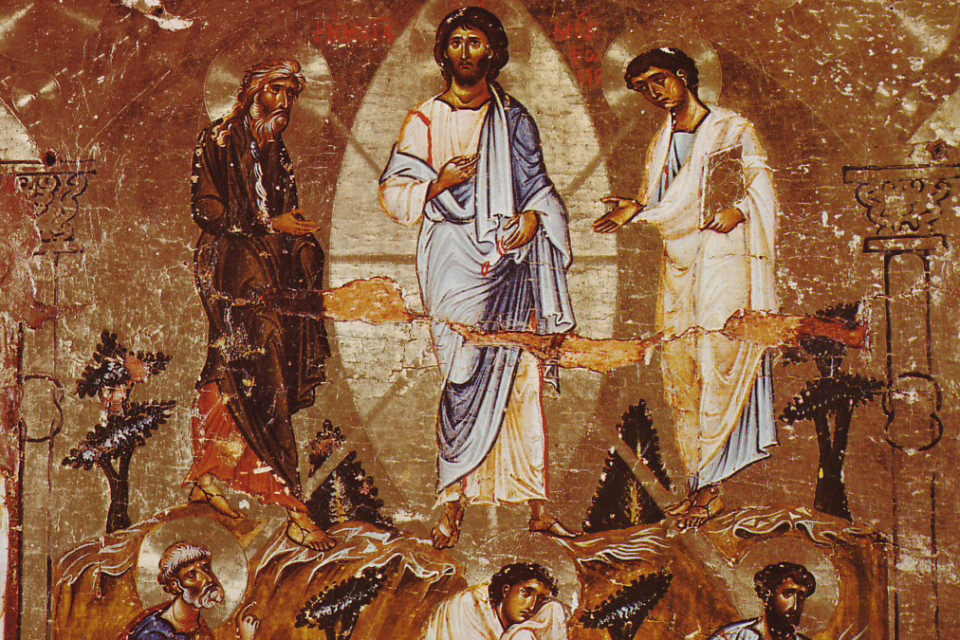Weekly Preaching: Transfiguration Sunday 2022
If you are United Methodist, it's worth noting that we could not have been gifted with a better liturgical date or texts than these memorable stories of Transfiguration. Whatever church bodies do, whether it's gone our way or not, the church is still God's. Jesus is still amazing. Our focus should always be on him, his glory, his mercy, his wisdom, his presence. Surely this is the way to preach this week - and maybe every week.
Not one or two but three great texts to mark the Transfiguration of our Lord! Exodus 34:29-35, the day Moses’ face began shining. Today we speak of someone’s face “beaming” or “glowing.” But it’s not that Moses had a chipper disposition or a cheerful countenance; he had seen God, and the shining of God lingered, impressed itself upon him. I’m not sure there’s a “Go thou and do likewise” here (or in our Gospel text!). Maybe the writer simply wants us to be awed by Moses, a theological hero if there ever was one. Or if there’s a “go thou and do,” it’s captured in something the newly sainted Oscar Romero said: “When we leave worship, we ought to go out the way Moses descended Mt. Sinai: with his face shining, with his heart brave and strong, to face the world’s difficulties.”
Context matters. Moses has just, in a holy rage, broken the tablets of the law. As the Jewish commentator Gunther Plaut put it, “The newly liberated people struggle to understand their God and God struggles to understand His people.” At least God and Moses ‘get’ one another. In Mesopotamia and Egypt, priests often wore a mask or veil when engaging in their sacred rituals. With Moses, it’s reversed: he wears the veil when he’s a civilian with the people, and it comes off when he’s up close with God! It’s a kind of humility — maybe the way St. Francis hid his stigmata. Or he wants to shield the people from his excess of holiness; we pastors suffer the opposite in every church, those who are so very pious and flout it in your face!
Moses’ glowing isn’t a private experience for him to enjoy. He shines as the one God has chosen to lead, the one who is God’s earthly connection to the people. There’s also the peculiar way this shining entered into Western art. The Hebrew translated “shone” or “radiance,” qaran, is an inch away from qeren, meaning horn. And so it became, in the Vulgate, that Moses was “horned.” We see his horns all over, most famously in Michelangelo’s statue in San Pietro in Vincoli in Rome. In Bible times, horns symbolized power, but by the Middle Ages horns represented the demonic. Moses became the epitome of anti-Semitic hostility…
...and much of the fault lies with our dear friend, Paul. Our Epistle, 2 Corinthians 3:12-4:2, exegetes why Moses hid his face, suspecting it was not humility but embarrassment, because the glory was fading (a notion unmentioned in our text)! The veil now cloaks them, the Jews, from seeing the truth. I can sympathize with Paul’s profound grief that his fellow-Jews, certainly including close friends and family, just didn’t see Jesus as the Messiah or Christianity as the way. It would be hard to preach this text now without lifting it up as one of the ways we fail to ‘get’ others who believe in our God in a different way? Can we revel in the transformation, even the transfiguration, that is life with God without being dismissive of other faiths?

There is a fading of the glory. Is it the gradual demise of the church? Is it our heightening secularism? Is it our fallen inability to see God? We at best know what we know with veiled faces; “now we see through a glass darkly,” and only “then face to face.” Maybe the preacher doesn’t reach for a “Go thou and do likewise,” but simply notices and points, like a docent in a museum, to the greatness that was Moses and the competitive zeal that was Paul. Then primarily, on Transfiguration Sunday, we move to the amazement that is Jesus.
Luke 9:28-36. What a text! And how easy it is to preach it poorly. The Transfiguration texts are, for me, exemplary of what goes wrong in much preaching. We make texts about us, our faith, our doubts, our serving, etc., when many texts are quite simply about God, or about how amazing Jesus is. The Transfiguration texts are my prime example in The Beauty of the Word; clearly these passages seek to make us amazed at Jesus. He dazzled them, he was in the company of Moses and Elijah. The lunge to build booths is what we always do; what’s the takeaway? I’ve heard “After the mountaintop experience, you go back down into the valley and get to work.” But this text isn’t about us! It’s about God. We are to be awestruck. The takeaway is the disciples were awed, amazed, stunned, moved. Can you preach a sermon that simply says Wow! Jesus is amazing! How do I love Jesus? What is lovable about him? Let us count the ways.
Luke’s Transfiguration episode is peculiar in that “They were speaking of his departure.” The Greek for “departure” is exodon, reminding us of the Exodus. Amazingly (to me), Luke reports that those with him are “sleepy” (as in Gethsemane). Verse 33: “Master, it is good that we are here” must be the great understatement in all of Scripture! As in the Baptism texts, God says “Listen to him!” (as if God knows we won’t listen to Jesus).
At best, the takeaway is that we who are awed by Jesus listen to him. Or maybe we just adore and worship him. “Jesus, I adore you, lay my life before you, how I love you.” Or maybe Dorothy Day got it right. Robert Coles was interviewing her late in her life and asked her to jot down some autobiographical remembrances. She responded with this: “I try to remember this life that the Lord gave me. The other day I wrote down the words ‘a life remembered,’ and I was going to try to make a summary for myself, write what mattered most — but I couldn’t do it. I just sat that there and thought of our Lord, and His visit to us all those centuries ago, and I said to myself that my great luck was to have had Him on my mind for so long in my life!”
What can we say March 3? Transfiguration originally appeared on James Howell's Weekly Preaching Notions. Reprinted with permission.

